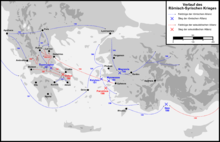192 BC Chr.
Portal history | Portal Biographies | Current events | Annual calendar
◄ |
3rd century BC Chr. |
2nd century BC Chr. |
1st century BC Chr. |
►
◄ | 210s BC Chr. | 200s BC Chr. | 190s BC Chr. | 180s BC Chr. |
170s BC Chr. |
►
◄◄ | ◄ | 195 BC Chr. | 194 BC Chr. | 193 BC Chr. | 192 BC Chr. |
191 BC Chr. |
190 BC Chr. |
189 BC Chr. |
► |
►►
| 192 BC Chr. | |
|---|---|
 The Roman-Syrian War begins. |
|
| 192 BC In other calendars | |
| Buddhist calendar | 352/353 (southern Buddhism); 351/352 (alternative calculation according to Buddha's Parinirvana ) |
| Chinese calendar | 41st (42nd) cycle , year of the Earth-Rooster己酉 ( at the beginning of the year Earth-Monkey 戊申) |
| Greek calendar | 4th year of the 146th / 1st year of the 147th Olympiad |
| Jewish calendar | 3569/70 |
| Roman calendar | from urbe condita DLXII (562) |
| Seleucid era | Babylon: 119/120 (turn of the year April); Syria: 120/121 (New Year October) |
Events
- Spring / Summer: After the magnetarch of the Greek polis Demetrias accused the Roman general Titus Quinctius Flamininus of an imperialist policy, he had to flee the city and a government friendly to Rome was installed. After Famininus returned to Rome, however, the Magnetarch was led back into the city by Aetolian troops and forcibly took control. As a result, the Aitolians tried to bring about an overthrow in the city of Chalkis and to win Nabis , the king of Sparta , for an alliance against Rome, both in vain. Nabis is murdered by the Aitolians during a joint maneuver, but they fail to gain control of the city.
- Rome is by no means ready to accept Demetrias' apostasy, which is why the envoy Publius Villius Tappulus threatens the city with consequences and thus indirectly also the Aitolians. Since an Aetolian defeat would also have an impact on the Seleucid empire allied with them , its ruler Antiochus III reacts . with an invasion of Greece, but without being particularly prepared for it. The subsequent Roman-Syrian war between the Seleucids and the Romans and their respective allies was preceded by a four-year cold war in which the two great powers did not succeed in defining their spheres of interest.
- Antiochus is warmly welcomed by the city lords who are hostile to Rome on his arrival in Demetrias. He moves on and, after a minor battle with Roman units, conquers Chalcis. Despite this success, the Greek states remain reserved towards Antiochus and are waiting and waiting. In winter the Seleucid-Aitolian alliance invades Rome-friendly Thessaly .
Died
- Nabis , King of Sparta
